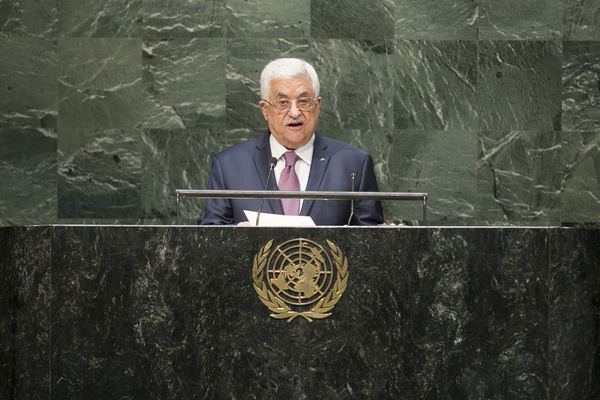
- “[U]nlike America, Europe is inherently anti-Semitic. This anti-Semitism is spread more or less evenly across the political spectrum and, therefore, it translates into widespread hostility to Israel. Europeans hate the Jews. Consequently, they hate the Jewish state.” — Robin Shepherd, A State Beyond The Pale: Europe’s Problem With Israel.
- No “Palestinian” leader has publicly disavowed jihad against Jews. Instead, every aspect of engagement by “Palestinians” with Jews and Israelis is considered an obligation for advancing this jihad until its final expected objective of pushing the Jews out of “Palestine” has been reached.
- The doublespeak of the Palestinian leadership made no difference within the UN. Since the June 1967 war, the UN began to tilt away from being fair and balanced toward Israel, and extended support to Arabs of the “occupied” West Bank and Gaza as an indigenous “Palestinian” people supposedly wronged by Jews.
- “The long march through the UN has produced many benefits for the PLO. It has created a people where there was none; an issue where there was none; a claim where there was none. Now the PLO is seeking to create a state where there already is one.” — Jeane Kirkpatrick, U.S. ambassador to the UN (1981-85).
- All of this occurred with the complicity of member states of the once-Christian West in the UN against one single and much maligned Jewish state, Israel, surrounded by hostile Arab and Muslim states in the Middle East.
The passage of the UN Security Council Resolution 2334 just before Christmas 2016, with the United States abstaining, was an IED-wrapped Chanukkah gift that lame-duck President Barack Hussein Obama delivered to Israel. It was another signal to Palestinians that they may continue their “rejectionism” of Israel, and stage another round of jihadi terrorism providing the UN the excuse to deliver pre-packaged condemnations of any Israeli reaction to the maiming and murder of Jews in the so-called “occupied” territories.
The U.S. abstention was an appalling betrayal of a people wrongly maligned by a sitting American president who for the past eight years went about assuring American Jewry, especially liberal Jews loyal to his party, that he was the most pro-Israel occupant of the White House. Instead, Obama’s decision, as a parting shot before he left office, not to veto Res. 2334 lifted the veil over the unspoken animus that he not only harbors within himself but also one that still stirs many within Western nations against Israel despite their solemn public denunciations of anti-Semitism.
This is evident in the language of Res. 2334. It exclusively condemns Israel stating: “settlements in the Palestinian territory occupied since 1967, including East Jerusalem, has [sic] no legal validity and constitutes a flagrant violation of international law”. It also effectively revokes Security Council Res. 242 of 22 November 1967.
There was no pretense in Res. 2334 to be fair, and hold Palestinian Authority (PA) and with Hamas equally responsible for inciting terrorist violence against civilians within Israel, thus poisoning any diplomatic effort required for a negotiated settlement between the parties. The adoption of Res. 2334 was a “gang up” by France, Eurabia, the US and the 57 countries of the Organization of Islamic Cooperation (OIC) against Israel. It was reminiscent of the long, shameful history of Jews as a minority people, abused and tormented by the majority among whom they resided.
For the past half century, Res. 242 was the keystone in the UN framework for peace in the Middle East. It laid out the process envisaged in the “land-for-peace” formula between parties in conflict following the June 1967 war. And on the basis of this formula Israel reached peace agreements with Egypt and Jordan in the aftermath of the October 1973 war.
But Res. 2334, instead, categorically states, the UN “will not recognize any changes to the 4 June 1967 lines, including with regard to Jerusalem, other than those agreed by the parties through negotiations.” In other words, the demand is on Israel to return to the 1949 armistice lines an outcome pre-determined by Res. 2334.
If Israel cannot now trade “land-for peace”, since land held after June 1967 war is deemed “illegal,” then there is no further reason for any negotiated settlement.
Israel cannot simply accept a status quo ante bellum that would be untenable for Israel’s security — Israeli Minister of Foreign Affairs Abba Eban called then the “Auschwitz borders” — and the PA, with backing of the UN.
Res. 2334 is then a formula for continued terrorist violence by Palestinians against Israelis. The adoption of Res. 2334 — not unintentionally — has driven a nail into the promise of the “two-State solution.” The Security Council was warned ahead of the December 23 vote by President-elect Donald Trump that the United States under his administration will not accept this blatantly anti-Israel resolution.
It needs to be asked — political correctness set aside — of the other four permanent members of the Security Council (Britain, China, France, and Russia): Why, at this time — when the situation in the Middle East has gone from bad to worse — has the Security Council decided to weigh in against Israel, the only democracy and oasis of sanity in the region that has imploded through an excess of Arab-Muslim bigotry and fanaticism?
And, why did the Security Council, whose record in the Middle East is one of abysmal failure in providing “peace and security” to people most in need — the beleaguered Christians, Yazidi, and Kurdish minorities of Iraq and Syria — decide to revoke the long-standing Res. 242 on the patently false excuse of “salvaging the two-State solution”, when the Palestinian leadership has continually refused to engage with Israelis in direct negotiations?
These questions require credible answers, but none can be given.
The real story in the adoption of Res. 2334 lies in the persistence of anti-Semitism within the UN.
Islamists, and Muslim states singly, or together, cannot advance any anti-Semitic policy in the UN detrimental to the security of Israel without the support, direct and indirect, of the Christian West. The Security Council vote on December 23 is the definitive proof. The ugly truth that many Israelis know, is that without Western complicity anti-Jew hatred of Arabs and Muslims post-Holocaust could not take root and flourish within the UN.
***
The last act of Obama’s presidency, in the grim shadow of Aleppo’s destruction, will be Obama’s legacy — of playing Brutus to Israel.
Obama conned a majority of liberal American Jews, throughout his two-terms, into believing he would keep Israel secure against her enemies. The liberal American Jews, as loyal supporters of and donors to the Democratic party, willingly subscribed to Obama’s smooth sale pitch directed at them: that he would be, as the first black president, a steadfast friend and protector of Israel in a world insanely hostile against Jews.
The facts about Obama and his politics, however, were contrary to the image crafted for him and that duped liberal American Jews.
Obama was groomed in the anti-Vietnam War ideological stew of anti-Americanism blended with a potpourri of new left cultural Marxism of Herbert Marcuse; the left-wing anarchism and utopianism of Noam Chomsky; the radicalism of the community organizer Saul Alinsky; the reflexive anti-imperialism and anti-colonialism of “third world” ideologues, such as Frantz Fanon and Edward Said; the radical politics of student activists, such as Tom Hayden and Abbie Hoffman, of the nineteen-sixties; and the Black “identity” politics of Jesse Jackson, Al Sharpton, and Obama’s mentor Reverend Jeremiah Wright in Chicago that snugly fit with the filthy anti-Jew politics of Louis Farrakhan and his “Nation of Islam.”
This ideological mixture was apparently a potent, mind-warping, brew. When fed to young minds in schools and colleges, as it was with Obama, with little experience of the real world and even less familiarity with world history, it infected many of them with the politics of grievance to turn resentful against their own society.
It took an outsider, like Dinesh D’Souza, an immigrant from India, to see through Obama’s mask the angry face of a mulatto. In The Roots of Obama’s Rage, D’Souza described the psychological motive behind Obama’s politics as a misfit in the America of his mother (a white woman), in the Africa of his father (a black man raised in the midst of anti-colonial struggle against imperial Britain in Kenya), and in a part of Asia of his stepfather (an Indonesian caught in the currents of anti-communism in his country under military dictatorship).
Obama needed support of American Jews as part of his strategy in winning and retaining the White House in the control of Democrats. The party, however, had moved so far to the left since the era of Bill Clinton’s presidency that for the rank-and-file members, support for Israel became increasingly contentious.
The leftward drift meant that domestically the Democratic party, in the name of “Progressivism,” embraced “third world” anti-capitalism and, in the realm of foreign policy, the UN’s “one world” agenda. It also meant adopting “identity” politics, and mobilizing a coalition of ethnic minorities among whom Muslim immigrant voters are headed in the near future to outnumber Jewish voters
The party of Truman embracing Israel had morphed into the party of Obama embracing anti-Zionism.
The results of the November 2016 election made redundant the charade surrounding Obama’s posturing as a faithful friend of Jews and Israel. For eight years Obama watched and contributed to the worsening of political disorder in the Middle East with a series of policy decisions — most notably the Iran deal lifting sanctions on vague promises from Tehran of putting a halt to its nuclear weapons program — that not only is funding the Iranian nuclear program it was purportedly supposed to stop — but it also greatly exacerbated Israel’s security environment.
Many believe that Obama’s refusal to veto a Security Council resolution was orchestrated by his own administration. But Obama’s national-security adviser, Ben Rhodes, sought to dismiss this betrayal, by blaming Israel.
According to Rhodes, as reported by the New York Times, “Absent this acceleration of settlement activity, absent the type of rhetoric we’ve seen out of the current Israeli government, I think the United States likely would have taken a different view.”
It did not matter to Obama that his explanation encourages Palestinian-Arab-Muslim view that their jihad in the long term will prevail against Israel. The Western powers delusionally believe that accommodation with Muslim states is of greater self-interest than indefinitely protecting the Jewish state against a hostile Muslim world.
The reason it did not matter is that Obama never publicly spoke out against the idea of Israel as a Western colonial outpost in the Arab heartland. It is a view he likely holds given his predisposition to embrace “third world” political grievances. Moreover, his friends, such the late Edward Said, Rashid Khalidi, and their academic cohorts in Western universities have peddled the view that Israel is, in the words of the late French Marxian historian, Maxime Rodinson, a “colonial-settler state.”
Europeans, led by France, began to tilt toward the Arab countries before the October 1973 Arab-Israeli war. A Euro-Arab Dialogue paved the way, as French leaders, beginning with De Gaulle saw in Arab North Africa, after French withdrawal from Algeria in 1962, a bridgehead for a Europe-Arab partnership, along with affordable oil and hopefully less terrorism.
France had supported Israel diplomatically and with military assistance during the period of the Algerian War (1954-62), which included the fateful alliance of France and Israel during the Suez War of 1956. But a crack opened in the Franco-Israeli relations after the June 1967 war.
Most likely in a fantasy of promoting France by currying favor with the Muslim states for more low-cost oil and optimistically less terrorism, De Gaulle turned on Israel.
Europeans increasingly came to view Israel, as the French leader depicted her. De Gaulle had used the word “occupation” in a reprimand of Israel, and the word lent support to Arab propaganda against Israel. This Euro-Arab Dialogue paved the way, as Bat Ye’or, the peerless historian of the Middle East and Islam, described, as the making of “Eurabia.”
In Europe, or “Eurabia”, it has become an article of “faith” that Israelis have wronged the “Palestinian” Arabs and have proceeded systematically, in the words of Charles de Gaulle, to “oppress,” “repress,” and “expropriate” them.[1] In supporting Arabs of Israeli “occupied” territories, Europeans can also assuage their guilt over the anti-Semitism of their past, and re-balance their sense of political morality by embracing Arabs and Muslims as people of the “third world” to atone for their past sins of colonialism.
But this European consensus on the Israeli-Palestinian conflict since the nineteen-seventies cannot obscure the ugly reality beneath. Europeans have not expunged anti-Semitism from their midst. As Robin Shepherd writes,
“[U]nlike America, Europe is inherently anti-Semitic. This anti-Semitism is spread more or less evenly across the political spectrum and, therefore, it translates into widespread hostility to Israel. Europeans hate the Jews. Consequently, they hate the Jewish state.”[2]
The American left finds itself ideologically at home with Europe’s mainstream politics, which mostly “Left”-leaning. Obama as a man of the “Left” is similarly at home with the European views about the world. Obama did not hide this affinity with Europeans from Americans; instead he publicized it when he took his campaign for the White House to Berlin in 2008.
Americans in general admire and support Israel. For Americans, the “special relationship” with Israel is special. Consequently, even as Obama shared the European consensus on Israel and did not hide his disdain for Prime Minister Benjamin Netanyahu, he kept his pretense of being a friend of Israel until nearly the end of his presidency.
At a deeper level, Obama’s animus, exposed over Res. 2334, also revealed his woeful ignorance of world history. All his foreign policy catastrophe have come from that: his reset button” with Russia; his courtship of other dictatorships such as Cuba and Iran; his premature withdrawal from Iraq thereby creating a vacuum filled by ISIS; his release of hard-core terrorists from Guantanamo Bay; his indifference to the Iranian people after the fraudulent elections of 2012; his enabling Iran’s nuclear program under the pretense of “preventing it; his murder by default of America’s ambassador to Libya and three other heroes; and his abandonment of Syria, creating more than half a million deaths to name but a few.

Samantha Power, Permanent Representative of the United States to the UN, at a Security Council meeting, on February 24, 2016. (Images source: United Nations)
|
Res. 2334, in falsely declaring Israeli settlements on disputed territories illegal, has ruled out negotiations by predetermining the outcome.
Israel is now denied control over the most sacred part of Jerusalem — the Temple Mount area and the Western Wall — that is at the heart of Jewish history, and the longing of Jews since their eviction from the City of David by the Romans in the first century C.E.
UN machinations also fabricated a previously non-existent identity for a people — the so-called “Palestinian” Arabs. In the process, the UN lent itself to the Arab and Muslim states, or the Organization of Islamic Cooperation (OIC), to advance their not-so-hidden agenda of undermining Israel’s security by demanding the establishment of a “Palestinian” state with boundaries existing prior to the June 1967 war.
In UN Security Council Res. 242 (1967), there is no mention of “Palestinian” people. They did not exist. After the dissolution of the Ottoman Empire in 1923, the area was mandated by the British who called it Palestine. Anyone born there — Jew, Arab or Christian — had Palestine stamped on his passport and was a Palestinian.
Resolution 242 called for a “just settlement of the refugee problem” without defining the refugees. Leaving “refugee” undefined meant that parties in conflict when negotiating would need to recognize that the partition of Palestine and the establishment of Israel led to the making of refugees among both Arabs and Jews — Arabs dislocated or evicted due to the partition and the war that followed, as were Jews from Arab states in the Middle East and North Africa.
The non-mention of “Palestinian” people, or “Palestinian Arabs, or “Palestinians” in Res. 242 was consistent with all previous resolutions, statements, and declarations made by the UN or its predecessor, the League of Nations.
***
In all but name, the wish to consummate Hitler’s “final solution” for Jews has animated a substantive segment of Arab and Muslim thinking since the establishment of Israel.[3] Each of the wars Israel has had to fight, beginning with the war in May 1948 against the combined Arab armies, if lost, had the potential of Jews being exterminated by Arabs in Palestine.
The Mufti Haj Amin al-Husseini escaped from Europe after the Nazi defeat and made his way into Egypt. The Allied powers never indicted him as a war criminal; he eventually retired as an Arab hero to Lebanon, where he died in 1974. The leaders of the “Palestinian” movement since 1945 have been the progeny of the Mufti.
The Mufti’s politics of jihad declared against Jews, beginning with the riots of 1921, has since then grown in intensity. No “Palestinian” leader has publicly disavowed jihad against Jews. Instead, every aspect of engagement by “Palestinians” with Jews and Israelis is considered an obligation for advancing this jihad until its final expected objective of pushing the Jews out of “Palestine” has been reached.
After the overwhelming defeat suffered by Egypt, Syria, and Jordan in the six-day war of June 1967, a practical response was needed by the Arab leaders to quell the seething anger of their people against them and re-direct that anger against Israel, while buying time to rebuild Arab strength. One response came in the Arab League Summit in Khartoum, Sudan, in August-September 1967. There the Egyptian leader, President Gamal Abdel Nasser, spelled out the “three no’s” — “no recognition, no negotiation, no peace” — in defining the collective Arab stand against Israel.
The other response was to build support for a resistance movement of Arabs both in Gaza (under Egyptian control until June 1967 war) and in the West Bank (under the control of the Kingdom of Jordan). Israel had warned Jordan to stay neutral during the buildup of the crisis ahead of the June 1967 war. But when King Hussein imprudently joined forces with Egypt and Syria against Israel, Jordan’s military defeat came with the loss of control over the West Bank. Arab governments officially designated the resistance movement launched from the “occupied” territories as the “Palestinian” struggle against Israel.
In the UN, after the June 1967 war, the great powers met with renewed energy to seek a diplomatic resolution in containing the Arab-Israeli conflict that might be spinning out of control. The result was Resolution 242, carefully crafted and unanimously adopted by the Security Council.
The resolution’s preamble, emphasizing “the inadmissibility of the acquisition of territory by war” was a pious wish with no basis in history or law, for if it did then much of the history of Western powers and their acquisitions of territories as result of wars would need revision. But even more to the point, Arab and Muslim states have continued to contravene the intent of the clause — Pakistan has occupied parts of Kashmir, Turkey has occupied parts of Cyprus, Morocco has occupied the Spanish Sahara, Russia has occupied Georgia, Ukraine and Crimea, and China has occupied Tibet.
The key point in the English version of Res. 242 with reference to Israel was withdrawal of its armed forces “from territories occupied in the recent conflict”. Arthur J. Goldberg, the U.S. ambassador to the UN (1965-68) involved in drafting the resolution, explained,
“The notable omissions in regard to withdrawal, from Israel’s viewpoint, are the words all, the, and the June 5, 1967 lines. The Israeli emphasize that there is lacking a declaration requiring Israel to withdraw from all of the territories occupied by it on and after June 5, 1967.”[4]
According to Goldberg, Israel tied its withdrawal “from territories” to the principle Res. 242 affirmed that every State in the area is entitled “to live in peace within secure and recognized boundaries free from threats or acts of force”. Since then, every American administration, until Obama’s, has supported this formula of “land-for-peace” without prejudging the outcome of the land that would be returned by Israel in reaching a final agreement with each of its opponents.
Arab states in the years since the adoption of Res. 242 eventually came to accept it as the framework for peace in the region. The reasoning was, again Goldberg, “the Arab States came to the conclusion that the language of the Resolution was the best they could hope for from the United Nations.”
Arab leaders also shrewdly sensed the tide of support for Israel as the “underdog” within the UN was shifting as new members, former colonies of the European powers, was emerging as a majority-voting bloc. These new members were more sympathetic to the cause of Arabs as the new “underdog” in the UN.
The leading Arab states in the decade and half after the June 1967 war — Egypt, Syria, Iraq, Algeria, Libya, Lebanon, Tunisia — continued to characterize their politics in terms of secular nationalism, even as support for Islamic fundamentalist parties began to grow among a new generation of radical youths. The Arab states became more diplomatically adept in pushing their interests at the UN and among the European powers. After the October 1973 war, Arab efforts to isolate Israel grew in tandem with the use of oil as a “weapon”.
It is during this period that the “Palestinian” movement under the banner of the Palestine Liberation Organization (PLO), and headed by Yasser Arafat, emerged from the shadows of internal Arab politics into the notice of the UN. In 1974 the Arab states with support of non-Arab Muslim countries, nonaligned members of the “third world”, and countries of the (former) Soviet bloc arranged for the UN General Assembly to invite Arafat to its opening session in New York. The following year the same group of countries adopted in support of Arab states the General Assembly resolution 3379 (1975) declaring, “Zionism is a form of racism and racial discrimination.” This resolution was revoked during the 1991 General Assembly session.
The PLO was not constrained by any of the recognized norms of an established state in waging its asymmetrical terrorist warfare against Israel. At the Munich Summer Olympics in 1972, a wing of the PLO — the “Black September” faction — took 11 Israeli athletes hostage and killed them. There were attacks on Israeli civilians and airplane hijackings by Palestinian terror groups, as the Arab war against Israel turned unconventionally terrorist.
The 1979 revolution in Iran under Khomeini was a victory for Muslim fundamentalists in the Middle East. Khomeini repudiated the idea of normalization between Muslims and Jews, between Israel and the Arab-Muslim states in the region and beyond. Khomeini invited Arafat to meet with him in Tehran, and he sharpened the language of jihad against Israel.
In October 1981 President Anwar Sadat of Egypt was killed by his own soldiers in a public military parade in Cairo. Sadat had signed a peace treaty with the Jewish state and had pushed for the normalization of Arab relations with Israel under the UN framework of Res. 242. Palestinians rejoiced over the murder of Sadat.
The Palestinian leadership spoke in a secular setting about Palestinian movement in terms of nationalist struggle, and in an Islamic setting in terms of jihad against Jews and Israel.
When Arafat was asked in South Africa in 1994 about the PLO accepting the Oslo Accords on the basis of Res. 242, he explained it as only a hudna (truce) with the enemy. He referred to the example of the treaty of Hudaibiyyah that Prophet Muhammad negotiated with his opponents in Mecca. In this treaty, Muhammad had promised a ten-year truce; but after he had strengthened his armies, he returned in only three years to obliterate the opposition.
The doublespeak of the Palestinian leadership made no difference within the UN. Since the June 1967 war, the UN began to tilt away from being fair and balanced toward Israel, and extended support to Arabs of the “occupied” West Bank and Gaza as an indigenous “Palestinian” people supposedly wronged by Jews.
After June 1967 war, Palestine came to no longer mean the territory designated for the establishment of Israel, as the Jewish homeland. It came to mean, instead, the land forcibly occupied by an alien people.
Until 1967, opposition to Jews and Israel, had been mounted in the name of Arabs, as was the jihad proclaimed by the Mufti Haj Amin al-Husseini on behalf of Arabs and Muslims against Jewish colonial-settlers in Palestine deemed an integral part of the Arab watan (homeland).
But in the years after 1967, Arabs of the territories “occupied” by Israel, and newly designated as “Palestinians,” came to be viewed in the Muslim world — enthusiastically backed by Europe, especially France — as the vanguard of a jihad against Jews. As Arafat said, agreements to him were merely hudnas (truces) with the enemy until the goals of the jihad — liberation of “al Quds” (Arabic for Jerusalem) and the annihilation of Israel, which Khomeini put forward as Islamic imperatives — were realized.
The mention of “Palestinians” as a people with inalienable rights, and not as refugees, was made for the first time in the UN General Assembly Resolution 2535 (XXIV), Section B, of December 10, 1969. From then onwards, the notion of the “Palestinian” people with “the right to self-determination” pushed by Arab and Muslim countries became a ritual in the UN. As Jeane Kirkpatrick, U.S. ambassador to the UN (1981-85), wrote:
“The long march through the UN has produced many benefits for the PLO. It has created a people where there was none; an issue where there was none; a claim where there was none. Now the PLO is seeking to create a state where there already is one.”
All of this occurred with the complicity of member states of the once Christian West, or Christendom, in the UN against one single and much maligned Jewish state, Israel, surrounded by hostile Arab and Muslim states in the Middle East.
***
The reputation of the UN for efficacy, justice, sense of history, is just about non-existent. Adam LeBor, a British author, in “Complicity with Evil”: The United Nations in the Age of Modern Genocide, has provided a grim indictment of the UN’s repeated failure to stop those who broadcast their genocidal intent to the world, as Hitler did.
When it comes to Israel, the United States and not the UN has protected her from the mob like behavior of the representatives of much of the world’s member states at its meetings. In the Security Council, there have been a few occasions, such as when the U.S. representative voted with the majority on a resolution condemning Israel in March 1980.
Daniel P. Moynihan, who had served as the U.S. representative to the UN (1975-76), in writing about what such a vote, instead of a veto, on the part of the United States at the Security Council meant, observed:
“The Security Council resolutions are time bombs. Ticking. The case has all but been made that Israel is an outlaw state, and indeed the General Assembly has now called on the Security Council to consider imposing sanctions against it. It will take the toughest minded diplomacy to dismantle the indictment now in place—thanks to the Carter administration; thanks to those who brought the Democratic party to such confusions. The new administration will have to deal also with the whole question of the Third World. It should be clearer now that hostility toward the West, toward the United States, is abiding and, it may be, burgeoning.”
As the new administration of President Donald J. Trump begins, it will take immense stamina and courage to stare down the “jackals” in the UN emboldened by Obama’s betrayal of Israel. Neither the late Daniel P. Moynihan, a distinguished and widely respected diplomat and Democratic Senator from New York, nor most Americans could have imagined that nearly four decades later another Democratic administration would sink lower than that of President Jimmy Carter in undermining America’s “special relationship” with Israel, the only liberal, open, pluralistic democracy in the Middle East.
Salim Mansur is a Distinguished Senior Fellow at the Gatestone Institute. He teaches in the department of political science at Western University in London, Ontario. He is the author of “Islam’s Predicament: Perspectives of a Dissident Muslim” and “Delectable Lie: A Liberal Repudiation of Multiculturalism.”








































